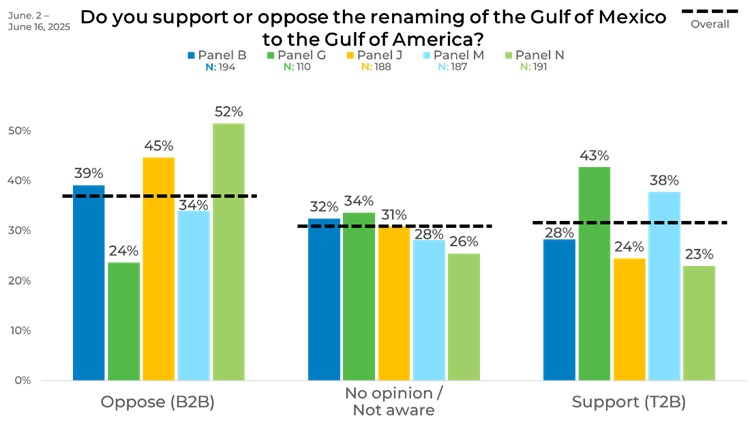
Air Travel Under Pressure: How Passenger Safety Perceptions Are Shifting
August 19, 2025
How Stigma Affects Support: First Findings from a Three-Part Mental Health Series
August 27, 2025Rename the Gulf of Mexico the Gulf of America, they said. What could go wrong? Turns out, plenty—while U.S. maps and regulators flipped the label, Mexico pushed back hard, even suing Google to keep history afloat.
But what do everyday people think about it?
We wanted to find out, so we asked about it in our latest round of research-on-research.
Let’s dive into data.
Overall
Overall, opinions are divided, with opposition slightly outweighing support. About 37% oppose the change, while 32% support it, and another 31% either have no opinion or were not aware of the change.

Gender
There were some definite trends when we break the data down by gender. Men lean more supportive, with 40% in favor compared to 32% opposed. Women, however, tilt in the opposite direction, with 42% opposed and only 24% supportive.
The difference is further emphasized when considering neutrality. About 28% of men report no opinion or lack of awareness, compared to 34% of women. Overall, men are more decisive in favor, while women show stronger leanings against the name change.

Age
Generational views on the renaming show contrasting patterns. Younger adults, especially those under 35, are more supportive, with support levels in the low to mid-30% range. Older groups, particularly those 65 and over, lean heavily toward opposition, with half rejecting the change outright.
Interestingly, younger respondents also express higher levels of neutrality, with over a third saying they have no opinion. Older adults, by contrast, are more decisive, either strongly supporting or strongly opposing the renaming.

Income
Household income reveals another split in opinion on the renaming. Support peaks among those earning over $100,000, with 42% in favor. Lower-income groups are less supportive, especially those earning under $20,000, where only 28% support the change. Unawareness or lack of opinion is most common in lower income brackets, reaching over 40% among those making less than $20,000.

Political Affiliation
Politics show the sharpest divide in this debate. Republicans are most supportive, with 53% in favor and just 16% opposed. Democrats stand firmly against, with 58% opposed and only 20% supportive. Independents fall in between, with more than a third opposed and similar numbers without a clear opinion.
Among those identifying with “other” political affiliations, opposition also outweighs support, and a large share express no opinion. These results reflect how political alignment strongly influences how people react to symbolic national changes.

Region
When looking at the data by region, opposition is relatively consistent. The Midwest and Northeast record the highest opposition, both near 40%. The South shows the strongest support at 34%, slightly ahead of the other regions. Levels of uncertainty are also consistent, with about 30% of people in each region either unaware of the change or holding no opinion.

Ethnicity
Ethnicity adds another dimension to the discussion. Caucasian respondents show the highest opposition, with 40% against and just under a third supportive. African American respondents are more evenly divided, with 31% opposing and the same share supportive. Asian and South Asian respondents stand out for their high level of neutrality, with nearly half having no opinion. Hispanic and Latino respondents, along with other groups, show balanced splits between support, opposition, and neutrality.

Panel
The panel data further highlights how results differ depending on the source. Panel N shows the highest opposition at 52%, while Panel G records the strongest support at 43%. The gap between these two panels represents the largest difference in results, showing a clear contrast in how different samples view the renaming. Other panels fall between these extremes, with varying levels of neutrality.

This highlights the need for strategic sample blending to ensure your data is not biased by panel. To learn how strategic sample blending can help you on your next study, click the button below to request a consultation.



